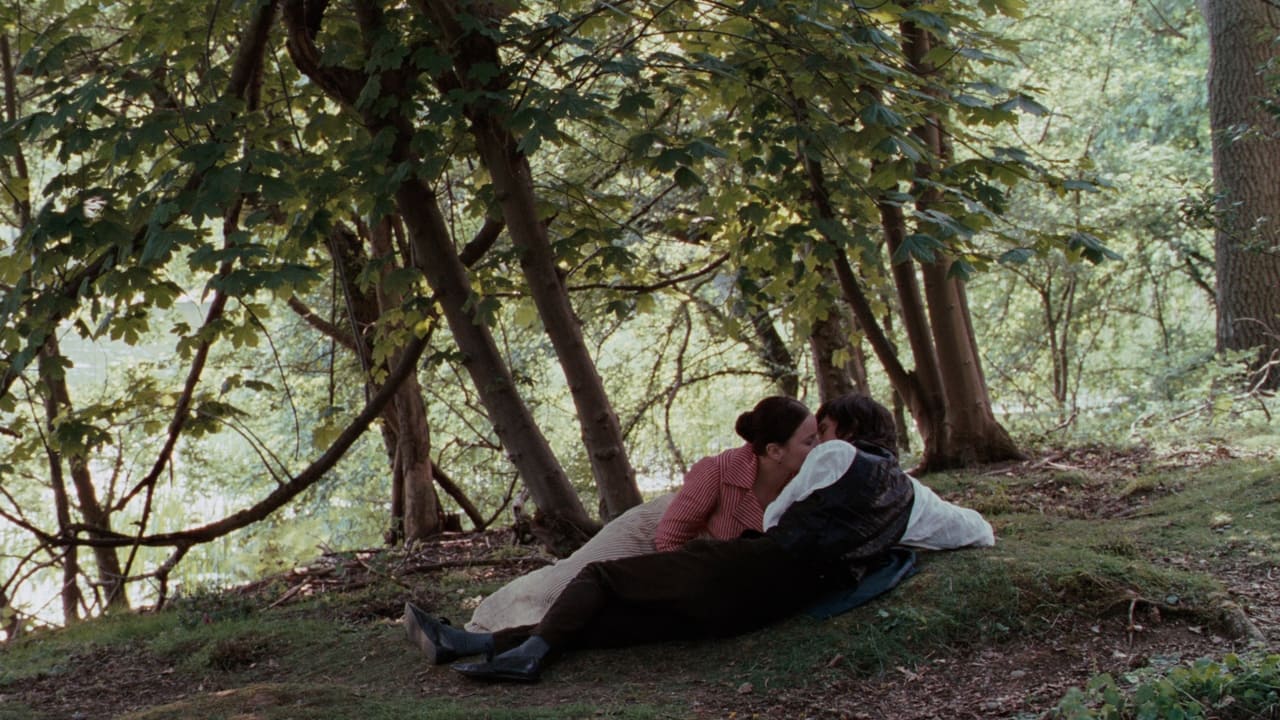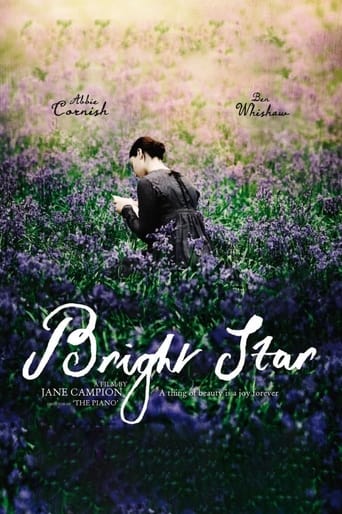

It's 1818 in Hampstead Village on outer London. Fanny Brawne (Abbie Cornish) is introduced to John Keats (Ben Whishaw). At first, he dismisses her as a fashionista. She pursues him by reading his poems. She shows compassion to his sick brother Tom who passes away. His lack of an income keeps him from truly pursuing a romance. His friend and writing mate Charles Brown (Paul Schneider) aims to show Fanny as a cruel flirt by sending her a Valentine.In the sure hands of Jane Campion, this has both a poetic and true feel of romance. She shows restraint which only heightens the passion. The Brown valentine is a shocking turn and the height of romantic drama. In particular, Abbie Cornish delivers a compelling of a relentless love from the heart and passion from the time era.
... View MoreAt its core Campion's Bright Star is an attempt to represent the essence of John Keats. Not an easy task for a director, and doubly difficult for an uninformed viewer. Keats' grave stone in Rome states: "Here lies one whose name was writ in water." Keats never lived to realize his success, he died before becoming famous. Similarly, his poems are accepted as exhibiting the recurring theme of yearning for and perhaps even glimpsing transcendence and immortality but ultimately falling back to earth. Few people are aware that the one exception to this is Keats' masterpiece of a Shakespearean sonnet, "When I Have Fears." A close reading reveals that unlike any other of Keats' works, he not only yearns for but actually reaches and achieves his goal in the heroic couplet. He transcends his mortal body and lives forever.This is why Campion selected "When I Have Fears" within her movie. This is also why, at the movie's climactic end when John Keats and Fanny Brawne must part company, there is nothing physical about that parting: no embrace or kiss, not even a look back. It is an attempt to demonstrate the immortal love Keats achieved - once -.
... View MoreThis is what movie making should be all about and not the relentless drivel that comes from Hollywood. I thought that Ben Wishaw and Abigail Cornish were perfect for the parts; I doubt that anyone else could have carried it off as well. Both actors were true to their craft and I have developed a deep admiration for Abigail Cornish as she is amazing, a mesmerising interpretation indeed. Paul Schneider also was perfect and carried off what, to me, was a very convincing Scottish accent. I also thought the setting perfect and what I loved was the authenticity of the representation of an era that had no rural street lighting, no properly paved roads and gardens that were turned over to produce. I loved the laundry fluttering in the breeze and the absence of background noise especially as it was filmed so close to London in England. I especially loved the cat, Topper and the little girl was sweet without being in the least bit precocious. I observed a remark, with astonishment, by someone who wrote a critique who thought the acting bad and I cannot comprehend the slightest failing that would lead this person to come to such an unintelligent conclusion. There was nothing about this movie that I didn't like and therefore rated it a ten. Well done Jane Campion, a masterpiece.
... View MoreAfter the grot, grime, filth and general unpleasantness of 2003's In the Cut comes the lavish, much more colourful and far easier-on-the-eye Jane Campion piece about two people coming together and forging a relationship. Gone is the dank, Hellish and greyed out locale of contemporary New York City and in its place arrives 19th century Hampstead, in England; a zone peppered with fields, rife with both tranquillity as well as a certain kind of beauty, and often abound with greens and yellows and purples. Away from the smut and corruption of her last film comes the piece about two people poised at respective stages in their lives coming together and lightly bonding - the film covers two people of a younger and more rawer disposition than that of In the Cut; ironic then, that the film would be a rawer and more involving experience as a result.The film will begin with some quilt-work, stitching and sewing and whatnot; with cuts gradually bringing us away from said activity, the person engaging in it and the building within which they were based in order to reveal a farm-like locale and a distant London skyline. Such an opening encapsulates the body of the film; that is to say a pulling away of something so intrinsic, or precise, in nature to reveal a wider picture of something – encapsulated in the film's going on to explore an intrinsic true-to-history tale of poet John Keats' tryst with a certain Fanny Brawne. Abbie Cornish is the one playing Brawne, while Ben Whishaw adopts the role of John Keats. Cornish does superbly, adding to the long list of Campion heroines that include Holy Smoke's Kate Winslet; The Piano's Holly Hunter and the aforementioned In the Cut's Meg Ryan; women getting too involved with men whom are initially perceived as their binary opposites and often getting entangled for the worse. It is she whom we observe stitching during the opening and through her extensive contacts of family and friends, a travelling to Keats' home is the order of the initial exchanges.Once there, Brawne appears opinionated and dares to challenge the far cockier and more confident of the household in additional poet Charles Brown (Schneider) on his work – as much as Brown is what he is, Keats appears shy and retiring through the fact he does not initially show at the gathering at all. In spite of living with Brown and sharing his career field, Keats is a thin and softly spoken fellow; appearing weak in his immediate appearance and lacking the facial hair his counterpart has. It is somewhat counter-balanced to that of Brown and his larger, more pompous disposition, which sees him strike us as rather outlandish and less caring. Shooting down Brown's jibes and petty comments, she goes so far as to denounce whatever little admiration for poetry she already had in front of most people, by which time Keats has appeared. It is additionally revealed his brother is suffering from a serious illness; his parents recently died and that he himself is struggling within his field with exposure and profit. But Keats is still somewhat of an entertainer, his stories and speech seeing most warm to him until the time comes to nail a spontaneous poem after dinner, upon which he falters.Through meeting Keats, Brawne purchases one of his books; this initial exposure to poetry beginning a change in her life which will go on to additionally affect that of Wishaw's character - her prejudices slowly dissipating to warmly lit shots of her lying flat on her back engaging with what this man has written. The two come to formulate more of a bond as the crux of the film progresses, their relationship delicate and often feeling pleasantly poised; a far cry from the franker and more brash nature of the bond between the two leads in In the Cut – so much so, that when Brown sends Fanny a valentine's card as she begins to get to know Keats a little more, it is an explosion of sorts within the realm Brawne and Keats currently occupy. Campion constructs these exchanges to a tee; there are no fast talking exchanges running on hip-dialogue whilst unfolding in a modern day locale rife with large amounts of snow on the ground, these natural and really well performed scenes resonating as they lyrically progress from interaction to interaction.Peppering their relationship is a stark, sociological ethic acting as a really tragically affecting over-tune which persistently threatens to destroy what they have. This is more broadly linked to an apparent agreement both parties should be privy to entering, should they ever consider marriage. Principally, and it's at this point the norms of the era within which the film is set make themselves painfully known thus instilling a greater sense of tragedy, it would be frowned up should the female participant of the marriage be relied upon for income above that of the male. Since Keats struggles within a highly specialist field of artistic and creative integrity, he cannot be relied upon for income to fund the state of matrimony; Campion going on to send up such a belief a wily way, challenging the ideological patriarchy and creating a story leading only to destruction and trauma eased little by the fact two people whom loved one another a great deal were not able to come together out of what are perceived to be false-propositions. It is a notion epitomised in Cornish's pained response to her peers, when she informs them that "You taught me of love, not of love for a specific class or rich person." Bright Star is a thoroughly engaging and really rather mature love story one is quite easily caught up in, and is near enough a considerable cut above most films of its year.
... View More